-
ORIGINAL ARTICLE11-22-2024
Transitions experienced by people living with limitations resulting from leprosy: a research-care study
Revista Brasileira de Enfermagem. 2024;77(5):e20230229
Abstract
ORIGINAL ARTICLETransitions experienced by people living with limitations resulting from leprosy: a research-care study
Revista Brasileira de Enfermagem. 2024;77(5):e20230229
DOI 10.1590/0034-7167-2023-0229
Views0See moreABSTRACT
Objective:
to understand the transitional processes that affect the adaptation of people who live with limitations resulting from leprosy.
Methods:
This is a qualitative study based on the precepts of Transition Theory, mediated by care-research, with 24 people with limitations resulting from leprosy in an ex-hospital colony in Piauí. Semi-structured interviews were carried out. The interviews were analyzed using Iramuteq software.
Results:
the researched-caregivers experienced the four types of transitions, including feelings of fear, worry, loneliness, hopelessness, guilt and a tendency to hide the diagnosis. Breakdowns and resignation were revealed, with spirituality, adaptation to the new life situation and acceptance as facilitating conditions for coping with the transitional process, with a consequent improvement in quality of life.
Final considerations:
the transitional processes had a positive significance, since they contributed to adaptation and the achievement of quality of life.
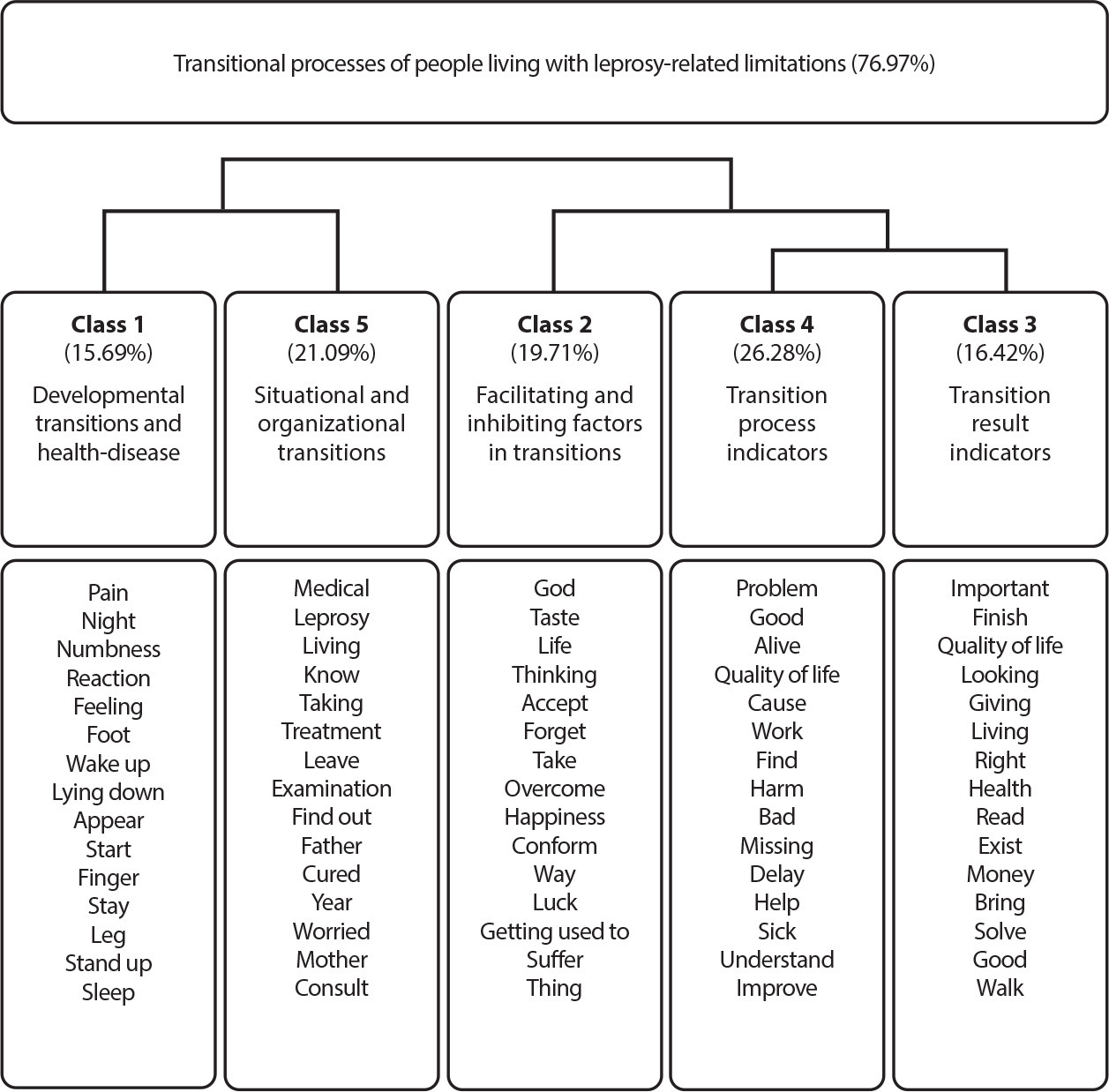
-
11-22-2024
Percepções de pessoas com deficiência física sobre acessibilidade e condições sociais: intervenções para enfermagem de reabilitação
Revista Brasileira de Enfermagem. 2024;77(5):e20240005
Abstract
Percepções de pessoas com deficiência física sobre acessibilidade e condições sociais: intervenções para enfermagem de reabilitação
Revista Brasileira de Enfermagem. 2024;77(5):e20240005
DOI 10.1590/0034-7167-2024-0005
Views0See moreRESUMEN
Objetivos:
analizar las experiencias de personas con discapacidad física adquirida en cuanto a accesibilidad y condiciones sociales; identificar intervenciones de rehabilitación dirigidas por enfermeras para la accesibilidad y condiciones sociales; determinar indicadores sensibles a la enfermería para mejorar la accesibilidad y condiciones sociales.
Métodos:
estudio cualitativo descriptivo-exploratorio utilizó entrevistas semiestructuradas con personas con discapacidad física adquirida mediante muestreo intencionado en bola de nieve para cumplir con todos los objetivos. El análisis de datos siguió los principios del análisis de contenido de Bardin. Los objetivos 2 y 3 se lograron mediante un enfoque teórico reflexivo.
Resultados:
los 27 participantes informaron desafíos de accesibilidad, que impactan las actividades de la vida diaria y las condiciones sociales. Esto influye en la enfermería de rehabilitación, dando lugar a tres campos de intervención: Evaluar la capacidad para realizar actividades diarias y los factores que influyen; Desarrollar e implementar capacitación para la realización de actividades diarias; Promover la movilidad, la accesibilidad y la participación social.
Consideraciones Finales:
a partir de las experiencias de los participantes, identificamos intervenciones de rehabilitación dirigidas por enfermeras para promover la accesibilidad y condiciones sociales.
-
ORIGINAL ARTICLE11-22-2024
Sociodemographic and occupational influences on health professionals’ quality of life
Revista Brasileira de Enfermagem. 2024;77(4):e20240010
Abstract
ORIGINAL ARTICLESociodemographic and occupational influences on health professionals’ quality of life
Revista Brasileira de Enfermagem. 2024;77(4):e20240010
DOI 10.1590/0034-7167-2024-0010
Views0See moreABSTRACT
Objective:
To analyze the sociodemographic and occupational influences on health professionals’ quality of life.
Method:
This descriptive-exploratory, cross-sectional, analytical, and quantitative study addressed 94 health workers, including nursing technicians, nurses, and physical therapists working in Intensive Care Units in a town in the extreme south of Brazil in 2023. The student’s t-test and Spearman correlation were used.
Results:
A significant positive correlation was found between being a woman and the psychological domain and between income and the social and environmental domain while working hours were inversely related to general QoL. Additionally, workload negatively impacted the physical, psychological, and general QOL, furniture negatively influenced the psychological domain, and equipment was negatively associated with the physical and psychological domain.
Conclusion:
The characteristics of the work environment interfere with several areas of quality of life.
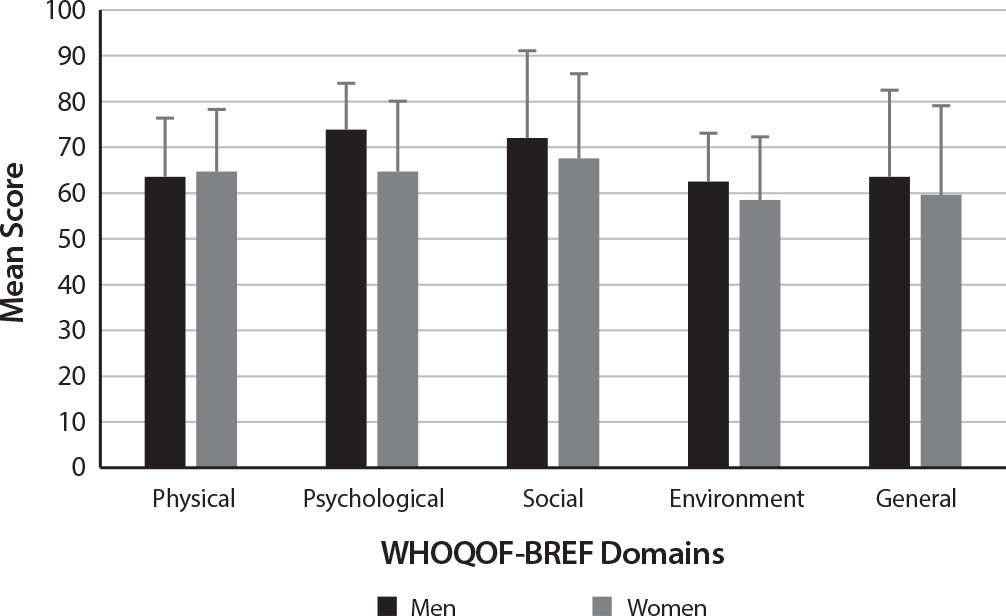
-
REVIEW11-22-2024
Concept analysis of youth: understanding the plurality of subjects
Revista Brasileira de Enfermagem. 2024;77(4):e20240002
Abstract
REVIEWConcept analysis of youth: understanding the plurality of subjects
Revista Brasileira de Enfermagem. 2024;77(4):e20240002
DOI 10.1590/0034-7167-2024-0002
Views0See moreABSTRACT
Objective:
To analyze the concept of “youth.”
Methods:
This is a concept analysis guided by the method proposed by Walker and Avant, operationalized through an integrative literature review. The search in scientific databases was carried out using the descriptors: youth; young; adolescence. To compose the literary corpus, 22 studies were selected.
Results:
Various factors were found in the antecedents that influence the separation of youth groups, contributing to the heterogenization of this population. The attributes include characteristics that comprise the formation of youth groups, especially the idea of shared experiences and social construction, as well as the consequences of the mentioned concept. After systematizing the variables, the analysis was conducted, highlighting the conceptions that influence youth.
Conclusion:
The study demonstrated the multifactorial complexity of the formulation of the concept of youth, highlighting various factors that contribute to this construction. For nursing, this conceptual field allows for an understanding of the population and effective engagement with this group.
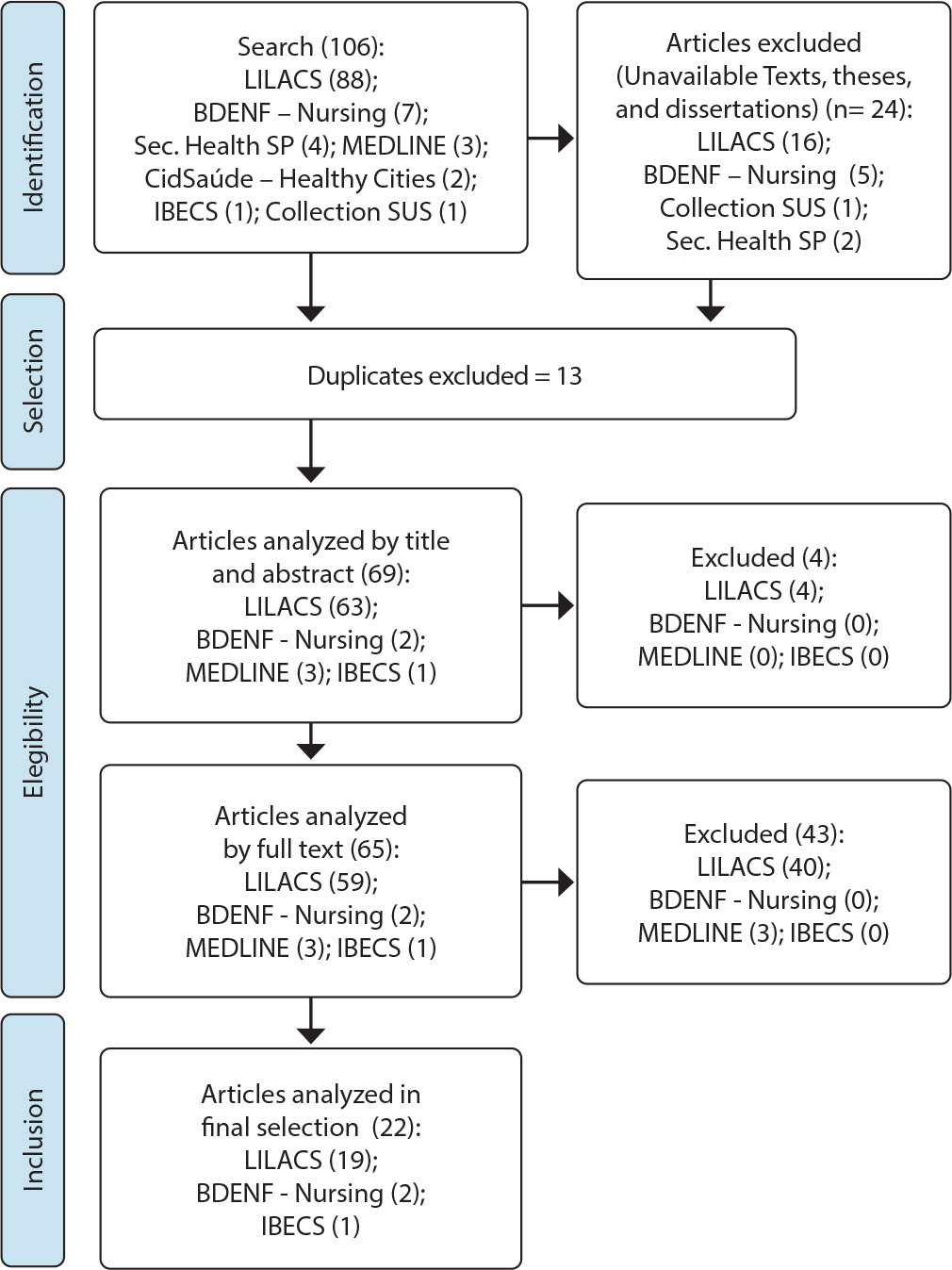
-
ORIGINAL ARTICLE11-22-2024
Temporal trends in neonatal mortality in Pernambuco
Revista Brasileira de Enfermagem. 2024;77(4):e20230451
Abstract
ORIGINAL ARTICLETemporal trends in neonatal mortality in Pernambuco
Revista Brasileira de Enfermagem. 2024;77(4):e20230451
DOI 10.1590/0034-7167-2023-0451
Views0See moreABSTRACT
Objective:
To verify the temporal trend of neonatal mortality in the health regions of Pernambuco between 2000 and 2020.
Method:
A time-series ecological study was conducted, analyzing the total neonatal mortality rate and its early and late components. For regression analysis, Joinpoint Regression was applied, trends were classified, and annual and average percentage changes were calculated for the period, with a significance level of 95%.
Results:
The average neonatal mortality rate in Pernambuco was 11.5 during the studied period. A decreasing trend in neonatal mortality rate was observed, especially in the early component. The region where the state capital is located showed the fastest decrease across all components.
Conclusion:
The temporal trend of neonatal mortality was decreasing; however, the rate of reduction was not uniform across the health regions of the state, and the implementation of the Mãe Coruja Pernambucana Program did not impact the trend in neonatal mortality.
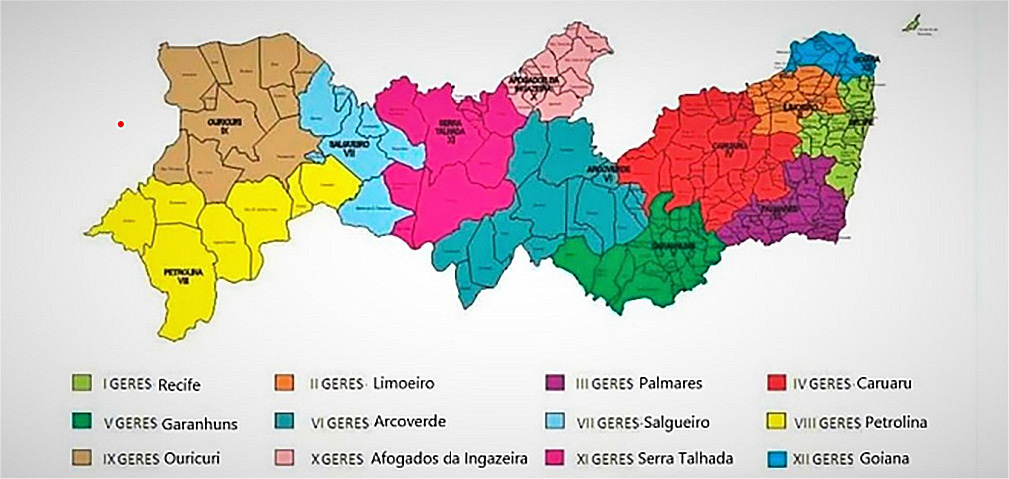
-
ORIGINAL ARTICLE11-22-2024
Evaluation of a video to promote HIV testing in sexual minorities
Revista Brasileira de Enfermagem. 2024;77(4):e20230320
Abstract
ORIGINAL ARTICLEEvaluation of a video to promote HIV testing in sexual minorities
Revista Brasileira de Enfermagem. 2024;77(4):e20230320
DOI 10.1590/0034-7167-2023-0320
Views0See moreABSTRACT
Objective:
To design and evaluate an educational video aimed at promoting HIV testing in gay men from the theoretical perspective of the Nola J. Pender Health Promotion Model.
Methods:
The design comprised five steps: 1.- Literature search; 2.- Formulation of the educational objective; 3.- Drafting of the script and location of the information in the theoretical components; 4.- Production; and 5.- Evaluation by experts and the target population.
Results:
The video “Living Without Fear” was produced, which presents the dilemma faced by gay men before taking a HIV test. The content validity index was 0.85, which indicated that the information was adequate and acceptable for promoting the rapid HIV test.
Final Considerations:
The results contribute to the scientific evidence aimed at promoting healthy behavior. In addition, the video was shown to be an acceptable educational tool.
-
ORIGINAL ARTICLE11-22-2024
Development and validity of a mobile application prototype for hospital shift handover
Revista Brasileira de Enfermagem. 2024;77(4):e20230173
Abstract
ORIGINAL ARTICLEDevelopment and validity of a mobile application prototype for hospital shift handover
Revista Brasileira de Enfermagem. 2024;77(4):e20230173
DOI 10.1590/0034-7167-2023-0173
Views0See moreABSTRACT
Objective:
To develop and validate a mobile application prototype for nursing shift handover in a hospital inpatient unit.
Methods:
A methodological study of technological production, carried out from April 2020 to January 2022, for mobile application construction and validity through the Design Thinking methodology. The study involved the stages of prototype development and validity by experts.
Results:
The application for mobile nursing shift handover obtained a usability score of 79 points and a content validity coefficient of 0.7.
Conclusions:
The instrument obtained an excellent assessment according to usability and agreement among experts. However, future studies are needed to implement this technology in order to assess effectiveness, time optimization and failures during communication.
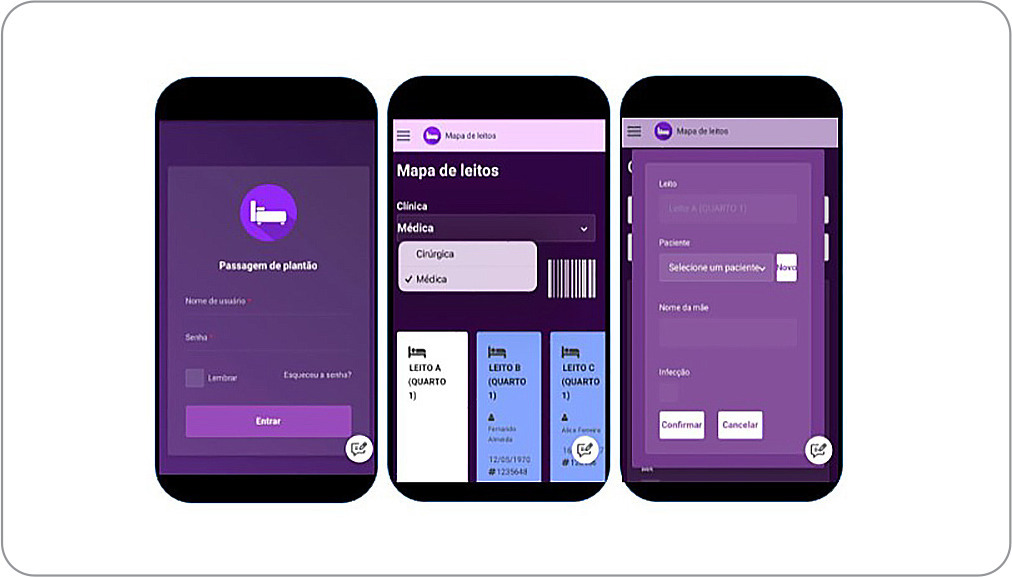
-
ORIGINAL ARTICLE10-25-2024
Analysis of the vaccination situation against Mpox in people living with HIV/AIDS: an ecological study
Revista Brasileira de Enfermagem. 2024;77(5):e20230234
Abstract
ORIGINAL ARTICLEAnalysis of the vaccination situation against Mpox in people living with HIV/AIDS: an ecological study
Revista Brasileira de Enfermagem. 2024;77(5):e20230234
DOI 10.1590/0034-7167-2023-0234
Views0See moreABSTRACT
Objectives:
to analyze the vaccination situation against Mpox in people living with HIV/AIDS in Brazil.
Methods:
an ecological study on the vaccination status against Mpox in people living with HIV/AIDS (PLWHA) in Brazil. The data were collected in April 2023 through information from the Ministry of Health, using the “Microsoft app Power BI,” which is publicly accessible.
Results:
the data analysis revealed that in Brazil, 2,978 doses of the MVA-BN Jynneos Mpox vaccine were administered in PLWHA, resulting in a vaccination coverage of 18.3%, with the southern and southeastern regions showing the lowest and highest vaccination coverage, respectively. Gender-based evaluation showed a higher proportion of vaccinated males.
Conclusions:
we identified low vaccination coverage in all regions of Brazil, highlighting the need for intensified vaccination activities, especially for PLWHA.
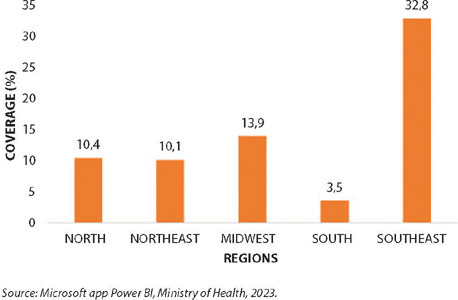
-
ORIGINAL ARTICLE03-24-2021
Costs of healthcare-associated infections in an Intensive Care Unit
Revista Brasileira de Enfermagem. 2021;74(1):e20200275
Abstract
ORIGINAL ARTICLECosts of healthcare-associated infections in an Intensive Care Unit
Revista Brasileira de Enfermagem. 2021;74(1):e20200275
DOI 10.1590/0034-7167-2020-0275
Views1See moreABSTRACT
Objectives:
to evaluate hospitalization costs of patients with and without Healthcare-Associated Infections an Intensive Care Unit.
Methods:
a retrospective case-control study. Data collection was retrieved from the medical records of Intensive Care Unit of a medium-sized public hospital in Goiás-Brazil. For each case, two controls were selected. Data on socioeconomic, clinical, and hospital costs were collected. To verify associations between variables, Odds Ratio and linear regression were calculated.
Results:
a total of 21 patients diagnosed with Healthcare-Associated Infections and 42 controls were evaluated. The hospitalization cost for patients with infection was four times higher than for non-infection patients (p-value<0.001). There was an association between infection and higher mortality (p-value <0.001), longer hospital-stay (p-value =0.021), and higher hospital costs (p-value =0.007).
Conclusions:
hospitalization costs of diagnosed Healthcare-Associated Infections patients are high compared to those who do not have this diagnosis.

-
ORIGINAL ARTICLE03-24-2021
Feelings, experiences and expectations of kidney transplant individuals and challenges for the nurse
Revista Brasileira de Enfermagem. 2021;74(1):e20200392
Abstract
ORIGINAL ARTICLEFeelings, experiences and expectations of kidney transplant individuals and challenges for the nurse
Revista Brasileira de Enfermagem. 2021;74(1):e20200392
DOI 10.1590/0034-7167-2020-0392
Views1See moreABSTRACT
Objectives:
to identify feelings, experiences, and expectations of kidney transplant patients, generated from the diagnosis of chronic renal disease until the post-transplant period, highlighting the challenges for nurses to incorporate individualized care to cope throughout the disease process.
Methods:
qualitative, descriptive research, carried with seven kidney transplant patients, in the city of Manaus, State of Amazonas. The data analysis followed the methodological referential of Bardin’s content analysis.
Results:
the diagnosis of the disease was experienced negatively, and hemodialysis was described as an imprisonment and health decline. The transplant meant an improvement in quality of life. The main difficulties were lack of a specialized hospital and low immunity.
Conclusions:
the nurses’ approach of chronic renal patient and with the renal transplantation favored the discovery of solutions facing the demands of the disease and allowed greater capacity to implement individualized care, surrounding a relationship of trust and respect.
-
ORIGINAL ARTICLE06-11-2021
Work at the surgical center: risks of the pathogenic suffering of the nursing team
Revista Brasileira de Enfermagem. 2021;74(2):e20190803
Abstract
ORIGINAL ARTICLEWork at the surgical center: risks of the pathogenic suffering of the nursing team
Revista Brasileira de Enfermagem. 2021;74(2):e20190803
DOI 10.1590/0034-7167-2019-0803
Views0See moreABSTRACT
Objectives:
to assess the risks of pathogenic suffering related to the experience of nursing workers in the operating room of a university hospital.
Methods:
cross-sectional, quantitative study, carried out from 11/2017 to 01/2018 in a university hospital in the South of Brazil. The sample was composed by 159 nursing workers of the units of a surgical center, that answered to the Scale of Evaluation of Pathogenic Suffering at Work. Data was submitted to statistical analysis.
Results:
the workers present low risk of pathogenic suffering related to the experiences at work, being the results of its factors: Uselessness (1.47±0.761) – low risk; Indignity (2.372±1.035) – medium risk; and Disqualification (1.74±0.903) – low risk.
Conclusions:
the evaluation of Pathogenic Suffering at Work Scale was positive, predominating low risk for pathogenic suffering of surgical center workers related to professional experiences, because they feel useful, valued and are not indignant about their work, feelings that reflect on the quality of care provided.
-
ORIGINAL ARTICLE05-21-2021
Music in the relief of stress and distress in cancer patients
Revista Brasileira de Enfermagem. 2021;74(2):e20190838
Abstract
ORIGINAL ARTICLEMusic in the relief of stress and distress in cancer patients
Revista Brasileira de Enfermagem. 2021;74(2):e20190838
DOI 10.1590/0034-7167-2019-0838
Views0See moreABSTRACT
Objectives:
to evaluate the effects of music on the physiological stress and distress of cancer patients being treated in a hospital.
Methods:
quasi-experimental study carried out with cancer patients hospitalized in the nursing wards of a public hospital. There was a single 15-minute intervention using music. It was individual, and headphones were used for patients to listen to three songs chosen by each one. The levels of stress and distress were measured before and after the intervention, using music to analyze the cortisol in the saliva and the answers to the distress thermometer. The significance level of the statistical analysis was 5%, using the non-parametric Wilcoxon test.
Results:
the mean age of the 26 patients was 56 years old. Most were female, white, and had breast cancer. After intervention, there were statistically significant diminutions in both stress and distress — p < 0.001.
Conclusions:
the use of music diminishes the stress and the distress of cancer patients.

-
ORIGINAL ARTICLE05-21-2021
Orthognathic surgery: doubts from patients with orofacial fissures regarding the immediate postoperative period
Revista Brasileira de Enfermagem. 2021;74(2):e20200089
Abstract
ORIGINAL ARTICLEOrthognathic surgery: doubts from patients with orofacial fissures regarding the immediate postoperative period
Revista Brasileira de Enfermagem. 2021;74(2):e20200089
DOI 10.1590/0034-7167-2020-0089
Views1See moreABSTRACT
Objectives:
to identify the main doubts regarding the immediate postoperative care of patients with orofacial clefts undergoing orthognathic surgery.
Methods:
cross-sectional, quantitative study, developed in a public and tertiary hospital, between November 2017 and May 2018. Data collection occurred through interviews during the preoperative nursing consultation. An instrument was used to describe doubts, which later were grouped according to the subject.
Results:
48 patients participated. The doubts referred to sun exposure (56%), food/mastication (48%), the relationship between intermaxillary block-breathing-vomiting (48%), oral hygiene (31%), physical activity restriction (27%), nasopharyngeal cannula, removal of surgical stitches, hospitalization time and speech/communication (23%), bleeding, cryotherapy, facial massage, aesthetic and functional results, healing, edema/ecchymosis, postoperative pain, and changes in facial sensitivity (21%).
Conclusions:
the doubts were related to food, the period of convalescence, care for the surgical wound, postoperative complications, and medications.
-
ORIGINAL ARTICLE05-28-2021
The work of a Brazilian nursing team of collective health in the special indigenous health district
Revista Brasileira de Enfermagem. 2021;74(2):e20200116
Abstract
ORIGINAL ARTICLEThe work of a Brazilian nursing team of collective health in the special indigenous health district
Revista Brasileira de Enfermagem. 2021;74(2):e20200116
DOI 10.1590/0034-7167-2020-0116
Views0See moreABSTRACT
Objective:
To identify the potential and the limits of the actions of the nursing team in the Primary Health Care for the Health of the Indigenous.
Methods:
This is a quantitative study guided by the Theory of Practical Intervention of Nursing and Collective Health. 230 nursing professionals participated, responding to an instrument about the frequency of the actions carried out in assistance, management, teaching, and research.
Results:
168 nursing technicians and 62 nurses participated. As strengths, 80% participated in the assistance most of the time. Stand out: 90.3% and 71% of nurses carried out nursing consultations and house visits, respectively. As a limitation, the involvement in education and research is small. Only 2% of the interviewees carried out scientific researches, reflecting the need to broaden and qualify care and improve the use of traditional practices, overcoming the biomedical model.
Final considerations:
Nursing assistance is essential in the modification and monitoring of the epidemiological profile of indigenous populations, and its results allow for the planning of quality actions.

-
ORIGINAL ARTICLE05-28-2021
Managed clinical protocol: impact of implementation on sepsis treatment quality indicators
Revista Brasileira de Enfermagem. 2021;74(2):e20200282
Abstract
ORIGINAL ARTICLEManaged clinical protocol: impact of implementation on sepsis treatment quality indicators
Revista Brasileira de Enfermagem. 2021;74(2):e20200282
DOI 10.1590/0034-7167-2020-0282
Views1See moreABSTRACT
Objectives:
to assess the impact of the implementation of a managed sepsis protocol on quality indicators of treatment for septic patients in an emergency department of a university hospital.
Methods:
an observational epidemiological study involving septic patients. The study was divided into two phases, pre-intervention and intervention, resulting from the implementation of the managed sepsis protocol. The study variables included sepsis treatment quality indicators. The results were statistically analyzed using the program Epi InfoTM.
Results:
the study sample included 631 patients, 95 from pre-intervention phase and 536 from intervention phases. Implementing the protocol increased patients’ chances of receiving the recommended treatment by 14 times. Implementing the protocol reduced the hospitalization period by 6 days (p <0.001) and decreased mortality (p <0.001).
Conclusions:
this study showed that implementing the managed protocol had an impact on the improvement of sepsis treatment quality indicators.

-
ORIGINAL ARTICLE06-16-2021
The meaning of nursing 200 years after Nightingale – perceptions of professional practice in the intensivist context
Revista Brasileira de Enfermagem. 2021;74(2):e20200364
Abstract
ORIGINAL ARTICLEThe meaning of nursing 200 years after Nightingale – perceptions of professional practice in the intensivist context
Revista Brasileira de Enfermagem. 2021;74(2):e20200364
DOI 10.1590/0034-7167-2020-0364
Views0See moreABSTRACT
Objectives:
to know the meaning of contemporary nursing from the experience of intensive care nurses.
Methods:
qualitative research based on the theoretical framework of Symbolic Interactionism and the methodological framework of Interpretive Interactionism. The setting was a general hospital in Bahia, being carried out with 12 nurses working in intensive care for at least one year, through semi-structured interviews and drawing-text-theme technique, whose data were organized according to Miles and Huberman and analyzed upon the referential.
Results:
the sense of being a nurse was evidenced; a being for care, resulting from the experience in intensive care, capable of promoting the development of professional self-image, by causing, in nurses, other skills – besides the scientific ones, such as empathy, creativity, spirituality and compassion.
Final Considerations:
the sense of being a nurse, currently, expresses developments inherited from the Nightingalean proposal, but transcends the technical-managerial emphasis of this to a humanistic care perspective converging with our contemporary professional identity: a being for care.

Search
Search in:
Nuvem de Tags
Adolescente (85) Atenção Primária à Saúde (239) COVID-19 (91) Criança (91) Cuidados de Enfermagem (269) Educação em Enfermagem (151) Educação em Saúde (139) Enfermagem (930) Enfermagem Pediátrica (86) Estudantes de Enfermagem (77) Estudos de Validação (131) Família (87) Idoso (208) Promoção da Saúde (99) Qualidade de Vida (104) Saúde do Trabalhador (86) Saúde Mental (145) Saúde Pública (82) Segurança do Paciente (150) Tecnologia Educacional (100)



